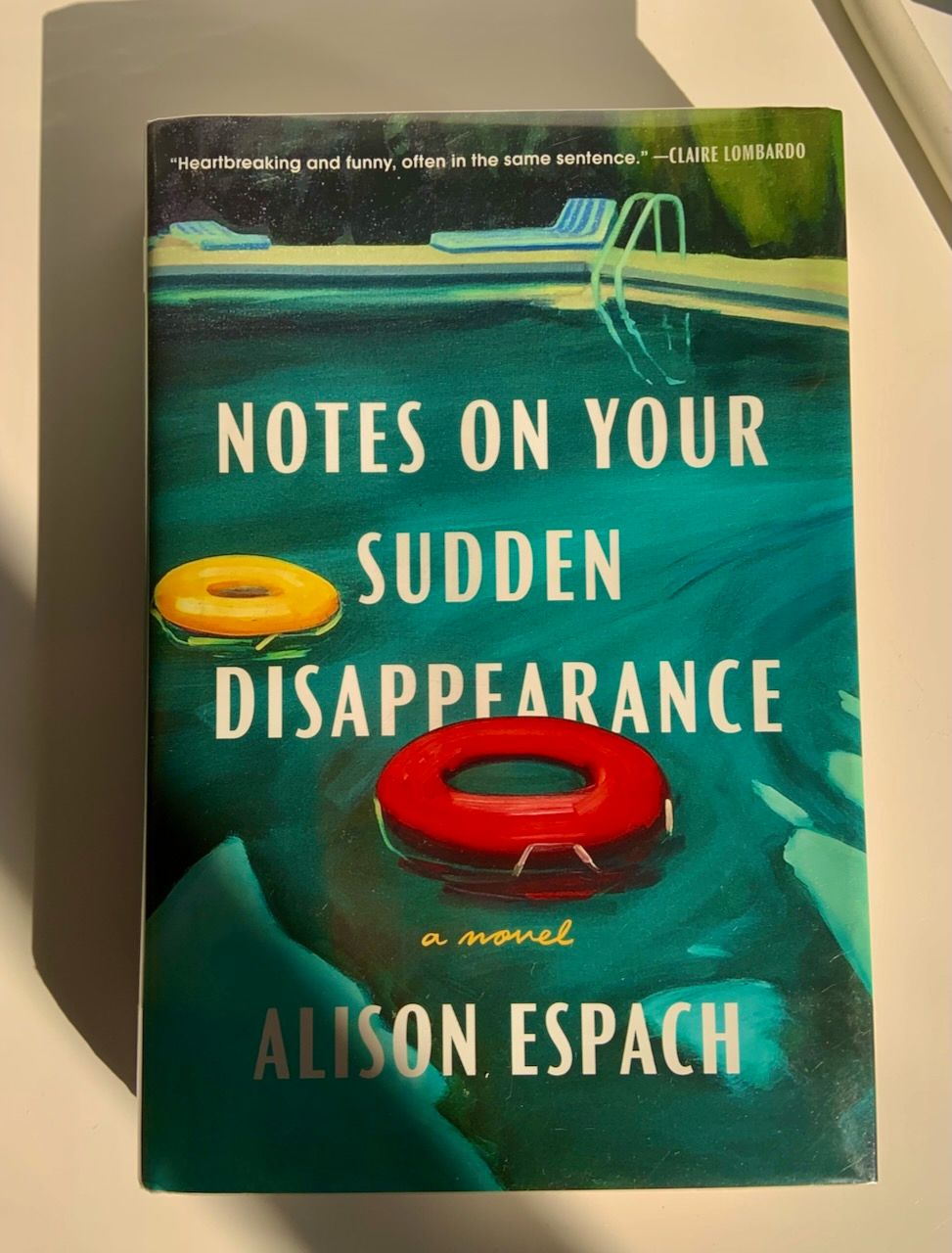July Jollities: Monthly Missives from The Dream Pedlar
Come, Dreamer! Let us fall into and explore the liminal groundlessness of transitions together.

Hello, Dreamer!
How extraordinary it is that we're standing on the precipice of end-July, ready to tip over into August in only a few hours from now!
There has been an unseasonal chill in the air these past few days. It was certainly a welcome respite from the heatwave that scorched this part of the world, and many others, in the preceding days. But it feels almost autumnal now.
We have a Rose of Sharon plant that typically blooms in late-August/early-September, and it is already in full bloom now. It has been so chilly in the mornings that visits to the beach have been rather infrequent so far this season.
We have more than a month of summer holidays to go as schools begin only in early-September. Yet, the local Walmart has already set up a section for 'School Supplies' right at the entrance, eerily similar to how Christmas lights begin to go up even before all the Halloween ghosts have been laid to rest.
Now, my mind conjures up an image of a pair of hands reaching from the far-end of the calendar to grab me and drag me at breakneck speed through the rest of the year – the last month of summer, the beginning of a new school year, Diwali, Halloween, Christmas and the winter holidays – and beyond that, all is dark.
A black abyss of the unknown. The impenetrable dark of the night that lies just beyond the pool of light cast by the lantern in my hand; the boundary separating the darkness from the light moves as I move, it keeps pace, it appears to relent a little but always stays tantalizingly out of reach. Like the horizon.
This is how my imagination goes into overdrive on the cusp of a transition, which is perhaps why I seem to be able to do most of my fiction writing during autumn and winter. (Or maybe that has something to do with schools being in session in those seasons.)
There is no dearth of transitions in our lives.
Birthdays. Weddings. Anniversaries. Seasons.
Sunrise. Sunset. Dawn. Dusk. That moment when the harsh heat of the afternoon sun suddenly dissolves into a balmy warmth.
Births. Deaths. Arrivals. Departures. A neighbour moving away. New neighbours taking their place.
Beginnings. Endings. Of a journey. Of a story. Of a life.
Writing the beginning of a new story. Writing 'The End'. Releasing a new book into the world and watch its fate unfold.
The first day of school. The last day of school. Holidays. Back-to-school. Sunday evenings, the end of weekends. The last Sunday of the month. Monday mornings, the beginning of a new work week.
Everything compels me to pause and take notice. Everything has the capacity to touch my heart, as if for the very first time, as if for the very last time.
For years, I tried to 'logic' my way out of these feelings in the face of a transition – the racing heart, the shallow breaths, that sensation of unexpected groundlessness, of losing balance and falling, falling, falling.
Oh, I knew it all in theory very well – that life is full of uncertainties, that under the blinding lustre of something new lurks the thick, dark grief of losing something old, the death of something familiar, that change means loss and death and rebirth and these are always unfolding all around us.
But this 'knowledge' – that everything changes – used to do little to soothe the constant resurgence of those all-too-familiar anxieties whenever change steamrolled its way into my life.
And I've often worried that this would somehow make me unfit to live in this world, let alone survive or even thrive.
Very recently, I read something that has allowed me to make more peace with this conundrum, this tug of war between feelings and knowledge, between the mind and the heart.
As a reward for having published Erased from Existence (yes, that book is out now, and you are the first to know, and that new development is what has coloured this month's newsletter with the brushstroke of the transition theme, and yes, we will get to news of the book shortly), I decided to purchase a paperback copy of How The Light Gets In: Writing As a Spiritual Practice by the late American poet, Pat Schneider.
I came across Schneider's poems only last week and their raw beauty took my breath away. In her book in which she shares more of her work and also about her writing life, she penned the lines below in a very different context, but her astute observation seems to apply universally.
"I can, of course, intellectually set aside those deep associations, but feelings have a deeper hold on us than our mental constructs. Changing our minds does not always change our feelings."
~ Pat Schneider in How The Light Gets In: Writing As a Spiritual Practice
And feelings always lead us to delve deeper into that liminal space, that vast expanse of groundlessness that opens up beneath us when the old and the familiar have passed and we are yet to settle into the new and the unfamiliar. But that simply won't happen unless we befriend the death-space we temporarily find ourselves in.
Out of perfection, nothing can be made. Every process involves breaking something up. The earth must be broken to bring forth life. If the seed does not die, there is no plant. Bread results from the death of wheat. Life lives on lives. Our own life lives on the acts of other people. If you are lifeworthy, you can take it. What we are really living for is the experience of life, both the pain and the pleasure.
~ Joseph Campbell
One teacher and author whose work revolves around the experience of transitions and anxiety is Sheryl Paul, whose book, 'The Wisdom of Anxiety', has had a profound impact on how I have been going through transitions off late.
We habitually think of transitions as “hard” or “negative”, but what most people fail to recognize is that embedded in these predictable life-cycle occurrences are opportunities that invite us to spiral into our fears and grief so that we heal at deeper levels each time. Instead of powering through transitions as quickly as possible, we would benefit greatly by embracing them as the gifts that they are.
From a spiritual perspective, every transition is an opportunity for growth. As we learn how to let go into the ‘groundlessness’ that defines the in-between stage of transition between the end of the old life and beginning of the new, we move into a more effortless alignment with life. Life is ever-changing, and when we approach transitions consciously and with the intention of growth, we eventually learn how to accept this truth with grace.
This is not an easy task. Transitions require no less than the willingness to die (symbolically), to sit in the uncomfortable void, and to be reborn. Who would willingly embrace this task?
~ Sheryl Paul in Conscious Transitions: The Seven Most Common (and Traumatic) Life Changes
Is it any wonder then that most of my works of fiction delve into the themes of death and loss, grief and heartache? It is such a fascinating concept, this liminal space that hovers between the old and the new! If I were to string the moments of my life together like flowers on a garland, most of them would be the daylilies of transition.
And so it is with my latest novel, Erased from Existence! It is a paranormal mystery. It is a ghost story. There are family secrets involved. And plenty of sunsets on a lavender farm.
And isn't the cover simply gorgeous? If it were not for the title, how could we possibly tell if the woman was disappearing or coming into being?
I absolutely enjoyed writing this book, and I hope it offers you too a lot of reading pleasure. Both ebook and paperback versions are available on Amazon. In the coming days, it will be available on several more platforms and this link will be updated accordingly.
Grab your copy here!

A lavender farm in summer.
A fifteen-year-old girl who loves the colours of sunset.
A handsome stranger who begs her to run away with him.
It could have been a love story. Except, it is not that kind of a story.
When a strange man approaches Rebecca Classion outside her farmhouse in the dead of the night and begs her to not go back inside, she does what any sensible fifteen-year-old would do. She runs straight back into the safety of home and slams the door shut behind her.
Only, it turns out to be the worst decision of her life.
From that day on, Rebecca Classion fades away. From the memories of all who once knew and loved her. From the perception of everyone she encounters.
Not a trace of her persists for more than a fleeting instant. Not her voice. Not a footprint.
All she yearns for is to exist again in the world of her loved ones.
But oblivion may be the only safe place. After all, to be seen is to be exposed. And some truths are better left hidden.
Start reading here!
And because we have spoken so much about moments of loss and metaphorical death, here's a poem from Pat Schneider who marvels eloquently at the aliveness she perceives in non-living objects. Because, how often do we even look at the cup that holds our tea or coffee patiently for us?
THE PATIENCE OF ORDINARY THINGS by Pat Schneider
It is a kind of love, is it not?
How the cup holds the tea,
How the chair stands sturdy and foursquare,
How the floor receives the bottoms of shoes
Or toes. How soles of feet know
Where they’re supposed to be.
I’ve been thinking about the patience
Of ordinary things, how clothes
Wait respectfully in closets
And soap dries quietly in the dish,
And towels drink the wet
From the skin of the back.
And the lovely repetition of stairs.
And what is more generous than a window?
Tales for Dreamers
The Piano Man
This story was written back in 2015, during a long-ago summer in Montréal. It was a pre-D, pre-pandemic era, but a liminal summer nonetheless, for we knew our stay there was only temporary, and we had made plans for where we'd be headed after that, but nothing could have prepared us for the biggest transition of all that was to come: parenting.

Books You May Love
After not being able to offer you much in this section over the past couple of months, I am beyond thrilled to share with you this month's find. Notes on Your Sudden Disappearance by Alison Espach. I can't help but laugh because, as it turns out, this story too deals with major life changes – transitions! – in a way that will mercilessly tear your heart and lift it up with innocent love at the same time.

Now it's time to bid goodbye, dear Dreamer!
Because we've spent our time together delving into the realm of the ephemeral, I'll leave you with images of the seemingly permanent. Many of you have read my post earlier this month on our recent trip to Vancouver, and I'm sharing here a couple of photos we took from the same spots back in 2015 and this year too.




Howe Sound in 2015 and in 2022; Diver in wet suit off Stanley Park seawall in 2015 and in 2022
Sometimes when life feels like its being driven by a stuntbike rider inside a circus cage, perhaps these images could remind us of the fleeting nature of transitions themselves!
As always, thank you for reading. In a world that is ever-changing, it is an honour for me to be able to knock on your (virtual) door and lay these words at your feet with a regularity of sorts. I hope they bring you both solace and delight in these fleeting times.
~ Anitha
Want to support The Dream Pedlar's writings? Here are a couple of ways to do that.




